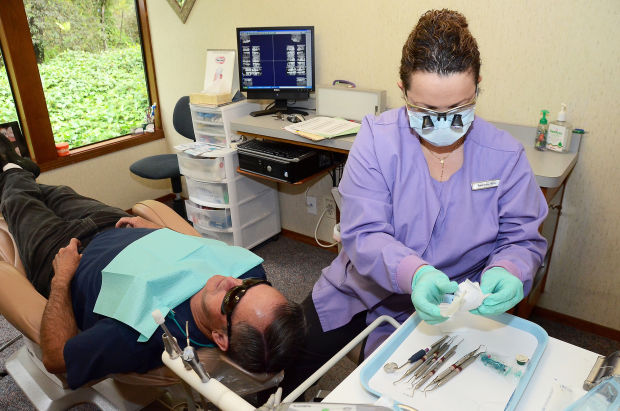Before undergoing any dental work at Browns Valley Dental, patients sit back in the dental chair and watch as instruments are unwrapped from sterilization bags. While it would be faster to have the instruments pre-set, the dental office wants patients to feel assured about safety.
“We open (the sterilization bag) in their presence,” dentist Peter Chung said. “It does take us a little extra time to organize all those instruments since we’re not doing it before they arrive, but it shows them we are using fresh sterile equipment.”
The significance of using properly sterilized equipment was given renewed focus last week after a dental office in Oklahoma allegedly exposed thousands of patients to blood-borne viruses. Approximately 7,000 people have been recommended to get tested for hepatitis and HIV, after the Oklahoma Board of Dentistry allegedly found the dental office used improperly sterilized instruments and contaminated drug vials.
While the risk of cross-infection at the dentist is rare, there are questions patients can ask to get a better understanding of how a dental office handles patient safety.
“If I was a patient, I would ask for a physical tour of the office,” said Tom Terry, a patient safety and risk management consultant, who specializes in working with dental offices in the Bay Area.
The dentist and the assistants should all be using the proper protective equipment — including a mask, eyewear, gloves and a lab coat, said Gina Fortunato, a registered dental assistant, who works for Napa dentist Glenn Giamo.
Staff should also be removing contaminated gloves and washing their hands between patients, Fortunato said. The chair in the treatment room should be covered with a barrier, and instruments should be in a sealed sterilization pouch or cassette, she said.
Napa dentist Charles Stratton said patients can also ask which type of sterilization an office uses — steam or chemical.
“Steam is state-of-the-art,” Stratton said. “It’s really the only way you should be sterilizing instruments.”
Stratton and Napa dentist David Goodwill both suggested that patients inquire about the experience level of staff members — specifically those who perform sterilization procedures. Some dental offices are cutting costs by hiring entry-level employees for $8 or $10 an hour to do sterilizations, Goodwill said. Patients can ask about who is performing the sterilizations, and if that person is licensed or trained, Stratton said.
Stratton’s and Goodwill’s dental offices, along with Giamo’s office and Browns Valley Dental, have all been deemed by the consultant Tom Terry as “exceptional” — meaning they maintain high standards in patient safety and infection control. These four dental offices are among at least 14 that Terry works with in Napa.
Goodwill, who has worked with Terry for about 15 years, said he hired him to ensure the office is up-to-date on all federal and state regulations. Terry will do an on-site inspection about twice a year to make sure the standards are being maintained and to notify the office of any needed changes, Goodwill said. The consultation service costs about $2,000 to $2,500 a year, he said.
Hiring a consultant is one of the only ways a dental office gets routinely inspected.
While dentists are required to attend regular training sessions to maintain their licenses, there is no federal or state agency that performs routine inspections of dental offices in California.
The Dental Board of California is complaint-driven — meaning they do not perform onsite evaluations of dental offices unless a complaint is filed. The same is true in Oklahoma, where the Board of Dentistry initiated its investigation after a former patient was believed to have contracted hepatitis C during dental surgery.
At Browns Valley Dental, Chung said that, so far, no patients have asked questions or expressed any concerns about the incident in Oklahoma.
“Hopefully, this sort of thing in Oklahoma is an isolated incident,” Chung said. “Of all the procedures done nationwide and worldwide, it’s not a common thing to hear about this, so as a whole, the profession is very safe. The risks associated with a (untreated) dental abscess are much worse.”

No comments:
Post a Comment